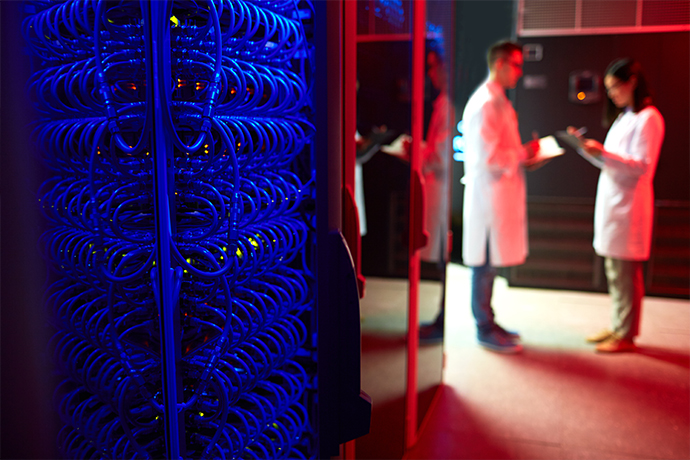Quantum Science and Technologies

In the early part of the 20th century, the discovery of quantum mechanics was a revolution in how scientists understood the world.
Today, in the early part of the 21st century, a second quantum revolution is unfolding, where exotic quantum phenomena unimaginable even a decade ago can be realized and studied given emerging experimental capabilities, and quantum effects can be harnessed for game changing technological applications.
Activities
Quantum efforts at ICFO are at the forefront of today’s research on both fundamental quantum science and novel quantum technologies, covering areas such as:
Quantum Communications and Quantum Internet
Encryption & protocols for secure communications & cybersecurity; quantum repeaters & quantum-memories for long distance quantum communications & the future quantum internet; quantum random number generators, highly efficient sources of polarization-entangled photons, & device-independent quantum information processing & quantum certification.
Quantum Processing and Quantum Artificial Intelligence
It is a fundamental question whether the schemes based on quantum mechanics can be used for classical information processing and machine learning. ICFO exploration of new avenues to solve computational problems in optimization & machine learning, using quantum or quantum-inspired hardware accelerators.
Quantum Atomic and Optical Sensors
Employing quantum processes arising from light-atom interactions in various platforms, including hot-vapor, laser-cooled, & ultra-cold atomic systems. ICFO has pioneering work on ultrasensitive quantum atomic clocks & gyroscopes, portable quantum atomic optical magnetometers for magnetic resonance diagnostics, & chip-scale and integrated miniaturized atomic devices.
Low-dimensional Quantum Materials
We explore low dimensional materials such as graphene, hBN, MoS2, NbSe2 , investigate their interactions with light at the nano-scale, and develop scalable technologies based on colloidal quantum dots as single photon emitters and single photon detectors. Also, ICFO explores novel quantum computing approaches, such as with the realization of carbon nanotube mechanical qubits.
Synthetic Quantum Matter for Quantum Simulation
Developing software and/or hardware to exploit engineered quantum systems (ultracold atoms, solid-state systems) as quantum simulators, quantum optimizers/annealers, and special purpose quantum computing devices capable of solving problems that are out of reach for classical supercomputers.
Fundamental Quantum Science
Creating novel quantum tech requires a deep understanding of quantum phenomena, such as entanglement and Bell nonlocality, from detection to manipulation and its use. Interactions between many quantum particles lead to the emergence of novel collective quantum phenomena, such as superfluidity, superconductivity & quantum magnetism, which are behind challenges in fundamental quantum physics & quantum tech applications. ICFO works in quantum, nonlinear and nano-optics & quantum many-body physics.
Groups
The main research objective of the group is to understand how quantum laws can be exploited to design novel protocols for information processing and communication, with an emphasis on quantum cryptography.
We investigate quantum electrical, mechanical, and optical properties of nanofabricated devices based on condensed matter systems, such as twisted bilayer graphene and carbon nanotube.
Our group works in a highly interdisciplinary field which fuses ultrafast laser physics, extreme nonlinear optics, atomic and molecular physics, SXR spectroscopy, X-ray optics, UHV technology, and electron-ion coincidence imaging techniques.
We explore the fascinating and interdisciplinary world of quantum interactions between matter and light confined to the nanoscale, to uncover rich new phenomena and powerful applications.
We investigate the quantum connection between single photons and atomic ensembles implemented with rare-earth doped solids and cold atomic gases.
Our group is focused on the study of the optical response of nanostructured materials, as well as the interaction of those materials with free electrons in the context of electron microscopy.
The quantum nano-optoelectronics group, led by Prof. Koppens, studies interactions between light and 2D materials for quantum technologies and novel ways of manipulating materials
The Quantum Optics Theory (QOT) group works on a wide range of topics of theoretical physics from quantum optics aand laser physics through quantum information science and quantum technologies to quantum field theory.
Our group uses the extraordinary coherence properties of atoms, together with an ever-increasing sophistication in optical manipulation and measurement, to study fundamental physics of light-matter interactions, quantum optical effects in advanced sensing, and new applications of extreme sensors.
We generate photons with novel features for exploring quantum theory and implementing applications that require specific forms of light.
We study and develop new advanced materials, devices and systems for information and communication technologies, in particular displays, image sensors and cybersecurity.
Our group performs quantum simulations with ultracold quantum gases, using atoms to engineer novel forms of quantum matter and to solve problems that are hard to tackle by classical means.
Research focuses on nanoscale optical fields and single emitters, using advanced experiments where ultra-small (nanotechnology) and ultra-fast (femtosecond spectroscopy) come together.